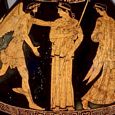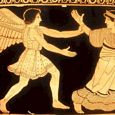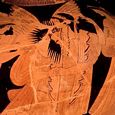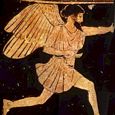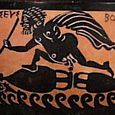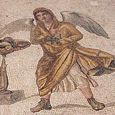BOREAS
Greek Name
Βορεας
Transliteration
Boreas
Roman Name
Aquilo
Translation
North Wind (boreas)
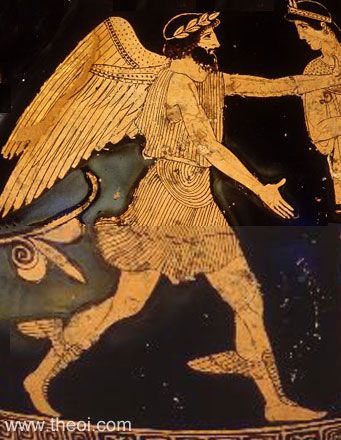
BOREAS was the purple-winged god of the north wind, one of the four seasonal Anemoi (Wind-Gods). He was also the god of winter who swept down from the cold mountains of Thrake (Thrace), chilling the air with his icy breath. Beyond his mountain home lay Hyperborea, a mythical land of eternal spring untouched by the god's winds.
When Boreas sought a wife, he carried off Oreithyia ("Mountain Gale"), daughter of King Erekhtheus (Erechtheus) of Athens, who was playing with her companions in a riverside meadow. Their children included Khione (Chione), goddess of snow, and the Boreades, a pair of winged heroes.
Boreas and his brother-winds were often imagined as horse-shaped gods in form. An old Greek folk belief was that the winds Boreas and Zephyros would sweep down upon the mares in early spring and fertilize them in the guise of wind-formed stallions. The horses born from these couplings were the swiftest and finest of their kind. The fabulous horses of King Laomedon of Troy were said to have been sired in this way by Boreas upon the Trojan mares.
In Greek vase painting Boreas was depicted as a striding, winged god. Sometimes his hair and beard were spiked with ice. In mosaic art he often appears as a gust blowing head with bloated cheeks up among the clouds. This imagery carried over into post-Classical art, and is frequently found in old maps. Boreas' name is simply the ancient Greek word for "north-wind" which was perhaps in turn derived from the Greek verb boraô meaning "to devour".
FAMILY OF BOREAS
PARENTS
[1.1] ASTRAIOS & EOS (Hesiod Theogony 378, Hyginus Preface, Nonnus Dionysiaca 6.18)
OFFSPRING
[1.1] ZETES, KALAIS (Hesiod Catalogues Frag 40A, Pindar Pythian Ode 4)
[1.2] ZETES, KALAIS (by Oreithyia) (Simonides Frag 534, Apollonius Rhodius 1.212, Hyginus Fabulae 14, Ovid Metamorphoses
6.679, Propertius 1.20, Suidas s.v. Gambros Erekhtheos)
[1.3] ZETES, KALAIS, KHIONE, KLEOPATRA (by Oreithyia) (Apollodorus 3.199, Apollonius
Rhodius 2.234, Pausanias 3.15.2)
[1.4] KHIONE (by Oreithyia) (Pausanias 1.38.2, Hyginus
Fabulae 157)
[2.1] HIPPOI TROIADES x12 (by Erikhthionios' mares) (Homer Iliad 20.219)
[2.2] HIPPOI AREIOI x4 (Quintus Smyrnaeus
8.239)
[2.3] HIPPOI EREKHTHEIOI x2 (by Aellopos) (Nonnus Dionysiaca 37.155)
[3.1] OUPIS, LOXO, HEKAERGE
(Callimachus Hymn to Delos 292)
[4.1] THE GIGANTES HYPERBOREIOI (by Khione) (Aelian On Animals 11.1)
[5.1] THE AURAI (Quintus Smyrnaeus
1.683)
[6.1] BOUTES, LYKOURGOS (Diodorus Siculus 5.50.2)
ENCYCLOPEDIA
BO′REAS (Boreas or Boras), the North wind, was, according to Hesiod (Theog. 379), a son of Astraeus and Eos, and brother of Hesperus, Zephyrus, and Notus. He dwelt in a cave of mount Haemus in Thrace. (Callim. hymn. in Del. 63.) He is mixed up with the early legends of Attica in the story of his having carried off Oreithyia, the daughter of Erechtheus, by whom he begot Zetes, Calais, and Cleopatra, the wife of Phineus, who are therefore called Boreades. (Ov. Met. vi. 683, &c.; Apollon. Rhod. i. 211; Apollod. iii. 15. § 2; Paus. i. 19. § 6.) In the Persian war, Boreas shewed his friendly disposition towards the Athenians by destroying the ships of the barbarians. (Herod. vii. 189.) He also assisted the Megalopolitans against the Spartans, for which he was honoured at Megalopolis with annual festivals. (Paus. viii. 36. § 3.) According to an Homeric tradition (Il. xx. 223), Boreas begot twelve horses by the mares of Erichthonius, which is commonly explained as a mere figurative mode of expressing the extraordinary swiftness of those horses. On the chest of Cypselus he was represented in the act of carrying off Oreithyia, and here the place of his legs was occupied by tails of serpents. (Paus. v. 19. § 1.) Festivals of Boreas were celebrated at Athens and other places.
Source: Dictionary of Greek and Roman Biography and Mythology.
ALTERNATIVE NAME SPELLINGS
Greek Name
Βοριαις
Βορεης
Βορρας
Θρηικιον
Transliteration
Boriais
Boreês
Borras
Thrêikion
Latin Spelling
Boreas
id.
id.
Thracion
Translation
(Aeolic spelling)
(Ionian spelling)
(Attic spelling)
Thracian
CLASSICAL LITERATURE QUOTES
PARENTAGE OF BOREAS
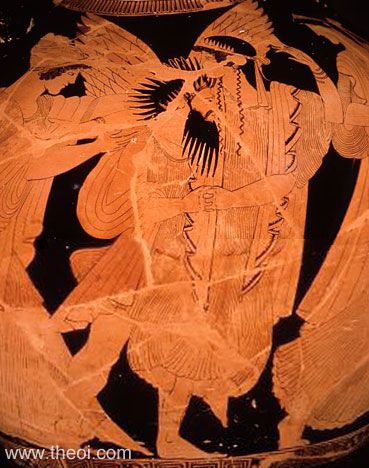
Hesiod, Theogony 378 ff (trans. Evelyn-White) (Greek epic C8th or C7th B.C.)
:
"And Eos (Dawn) bare to Astraios (Astraeus, Starry) the strong-hearted Anemoi (Winds), brightening Zephyros
(Zephyrus, the West Wind), and Boreas (the North), headlong in his course, and Notos (Notus, the South)--a
goddess mating in love with a god."
Pseudo-Hyginus, Preface (trans. Grant) (Roman mythographer C2nd A.D.) :
"From Astraeus and Aurora [Eos] : Zephyrus, Boreas, Notus, Favonius [Zephyros]."
Nonnus, Dionysiaca 6. 18 ff (trans. Rouse) (Greek epic C5th A.D.) :
"She [Demeter] hastened with quick foot to the house of Astraios (Astraeus) the god of prophecy . . . the
Aetai (Winds) [Anemoi], the sons of Astraios, welcomed the goddess with refreshing cups of nectar which was
ready mixt in the bowl . . . The four Aetai (Winds) fitted aprons round their waists as their father's waiters.
Euros (the East Wind) held out the cups by the mixing-bowl and poured in the nectar, Notos (the South) had the
water fready in his jug for the meal, Boreas (the North) brought the ambrosia and set it on the table, Zephyros
(the West) fingering the notes of the hoboy made a tune on his reeds of spring-time--a womanish Aetes (Wind)
this!"
BOREAS, OREITHYIA & THE BOREADES
Boreas abducted Oreithyia from Athens and fathered the winged twins Zetes and Kalais (Calais), know as the Boreades, and daughters Kleopatra (Cleopatra) and Khione (Chione).
Hesiod, Catalogues of Women Fragment 40A (trans. Evelyn-White) (Greek epic C8th or
C7th B.C.) :
"The sons of Boreas [the Boreades]."
Pindar, Pythian Ode 4. 180 ff (trans. Conway) (Greek lyric C5th B.C.) :
"And swift came [to join the Argonauts] two who dwelt beneath the strong foundations of Pangaion's
(Pangaeum's) height [a Thrakian (Thracian) mountain]; for gladly with a joyful heart their father Boreas,
sovereign of the winds, commanded Zetes and Kalais (Calais) to the task, those heroes whose backs on either side
bear fluttering wings of purple."
Simonides, Frag 534 (from Scholiast on Apollonius of Rhodes) (trans. Campbell, Vol.
Greek Lyric III) (C6th to 5th B.C.) :
"Simonides says that Orithyia was carried off from Brilessos (Brilessus) and taken to the Sarpedonian rock
in Thrake (Thrace) . . . Orithyia was daughter of Erekhtheus (Erechtheus), and Boreas carried her off from
Attika (Attica), too her to Thrake (Thrace), had intercouse with her there and fathered Zetes and Kalais
(Calais), as Simonides tells in The Sea-battle."
Aeschylus, Oreithyia (lost play) (Greek tragedy C5th B.C.) :
This lost drama described Boreas' marriage suit for the Athenian princess Oreithyia, its rejection by her
father and his subsequent abduction of the maiden. Weir Smyth (L.C.L.) notes : "In the two extant
fragments, which are cited as examples of pseudo-tragic diction, Boreas, enraged at the rejection of his suit,
threatens to display his power in its full force."
Aeschylus, Fragments 153 & 154 Oreithyia (from John of
Sicily, On Hermogenes' "Kinds of Style”) (trans. Weir Smyth) (Greek tragedy C5th B.C.) :
"[Boreas threatens :] ‘And check the oven's soaring blaze; for let me not behold some
soot, the tenant of the hearth, weaving in a single wreath of torrent flame, I'll fire the roof and cinder it.
But now--not yet have I blared my noble strain.’"
"[Boreas threatens :] ‘With my two jaws I blow a blast and confound the main.’"
Herodotus, Histories 7. 189 (trans. Godley) (Greek historian C5th B.C.) :
"Boreas had an Attic wife, Orithyia, the daughter of Erekhtheus (Erechtheus), ancient king of Athens."
Plato, Phaedrus 229 (trans. Lamb) (Greek philosopher C4th B.C.) :
"Phaidros (Phaedrus) : I should like to know, Sokrates (Socrates), whether the place is not somewhere here
at which Boreas is said to have carried off Oreithyia from the banks of the Ilissos (Ilissus)?
Sokrates : Such is the tradition.
Phaidros : And is this the exact spot? The little stream is delightfully clear and bright; I can fancy that
there might be maidens playing near.
Sokrates : I believe that the spot is not exactly here, but about a quarter of a mile lower down, where you
cross to the temple of Artemis, and there is, I think, some sort of an altar of Boreas at the place.
Phaidros : I have never noticed it; but I beseech you to tell me, Sokrates, do you believe this tale?
Sokrates : The wise are doubtful, and I should not be singular if, like them, I too doubted. I might have a
rational explanation that Oreithyia was playing with Pharmakeia (Pharmacia), when a northern gust carried her
over the neighbouring rocks; and this being the manner of her death, she was said to have been carried away by
Boreas. There is a discrepancy, however, about the locality; according to another version of the story she was
taken from Areopagos (Areopagus), and not from this place."
Pseudo-Apollodorus, Bibliotheca 1. 111 (trans. Aldrich) (Greek mythographer C2nd
A.D.) :
"[In a list of Argonauts :] Zetes and Kalais (Calais) sons of Boreas."
Pseudo-Apollodorus, Bibliotheca 3. 199 :
"As Oreithyia was playing by the river Ilissos (Ilissus), Boreas kidnapped her and had sex with her. She
bore him daughters named Kleopatra (Cleopatra) and Khione (Chione), and winged sons named Zetes and Kalais
(Calais)."
Apollonius Rhodius, Argonautica 1. 212 ff (trans. Rieu) (Greek epic C3rd B.C.)
:
"Next came Zetes and Kalias (Calais) [to join the Argonauts], children of Boreas, whom Oreithyia daughter
of Erektheus (Erechtheus) had borne to Boreas in the wintry borderland of Thrake (Thrace). It was from Attika
(Attica) that Thrakian Boreas had brought her there. She was whirling in the dance on the banks of Ilissos
(Ilissus) when he snatched her up and carried her far away to a spot called Sarpedon's Rock, near the flowing
waters of Erginos (Erginus), where he wrapped her in a dark cloud and overcame her. And now, these sons of hers
could soar into the sky. Astounding spectacle! As they flapped wings on either side of their angles, a glint of
gold shone through from spangles on the dusky feathers; an their black locks streaming from head and neck along
their backs were tossed by the wind to this side and that."
Apollonius Rhodius, Argonautica 1. 1304 ff :
"He [Herakles (Heracles)] killed them [the Boreades] in sea-girt Tenos on their way home from the games at
Pelias' funeral, made a barrow over them and on top set a couple of pillars, one of which amazes all beholders
by swaying to the breath of the roaring North Wind (Boreas)."
Apollonius Rhodius, Argonautica 2. 23 f :
"[King Phineos (Phineus) of eastern Thrake (Thrace) addresses the Argonauts :] ‘But there is an
oracle which says that these Harpyiai shall be dealt with by the two sons of Boreas--no unknown foreigner shall
drive them off. That is the truth, if I indeed am Phineos, once famous for his wealth and his prophectic skill,
Phineos, Agenor's son, who when he ruled in Thrake won Kleopatra, sister of that pair, with his bridal gifts and
brought her to his.’"
Diodorus Siculus, Library of History 4. 43. 3 (trans. Oldfather) (Greek historian
C1st B.C.) :
"Kleopatra (Cleopatra), who men said was born of Oreithyia, the daughter of Erekhtheus (Erechtheus), and
Boreas."
Strabo, Geography 7. 3. 1 (trans. Jones) (Greek geographer C1st B.C. to C1st A.D.)
:
"Sophokles (Sophocles) [C5th B.C.], when in his role as a tragic poet he speaks of Oreithyia, tells how she
was snatched up by Boreas and carried 'over the whole sea to the ends of the earth and to the sources of night
and to the unfoldings of heaven and to [Hyperborea] the ancient garden of Phoibos (Phoebus) [Apollon]."
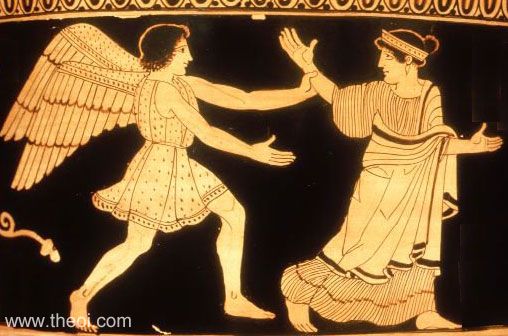
Pausanias, Description of Greece 1. 19. 5 (trans. Jones) (Greek travelogue C2nd A.D.)
:
"This Ilisos (Ilissus) [at Athens] is the river by which Oreithyia was playing when, according to the
story, she was carried off by Boreas. With Oreithyia he lived in wedlock, and because of the tie between him and
the Athenians he helped them by destroying most of the foreigners' warships. The Athenians hold that the Ilisos
is sacred to other deities as well."
Pausanias, Description of Greece 1. 38. 2 :
"Eumolpos (Eumolpus) they say came from Thrake (Thrace), being the son of Poseidon and Khione (Chione).
Khione they say was the daughter of the wind Boreas and of Oreithyia."
Pausanias, Description of Greece 3. 15. 1 - 4 :
"Erekhtheus (Erechtheus) married Praxithea . . . and had sons . . . and daughters, to wit, Prokris
(Procris), Kreusa (Creusa), Khthonia (Chthonia), and Orithyia, who was carried off by Boreas . . .
While Orithyia was playing by the Ilissos river, Boreas carried her off and had intercourse with her; and she
bore daughters, Kleopatra (Cleopatra) and Khione (Chione), and winged sons, Zetes and Kalais (Calais). These
sons sailed with Jason and met their end in chasing the Harpyiai (Harpies); but according to Akousilaus
(Acusilaus) [mythographer late C6th B.C.], they were killed by Herakles (Heracles) in Tenos. Kleopatra
(Cleopatra) was married to Phineus, who had by her two sons, Plexippos (Plexippus) and Pandion. When he had
these sons by Kleopatra, he married Idaia (Idaea), daughter of Dardanos (Dardanus). She falsely accused her
stepsons to Phineus of corrupting her virtue, and Phineus, believing her, blinded them both. But when the
Argonauts sailed past with the Boreades, they punished him. Khione (Chione) had connexion with Poseidon, and
having given birth to Eumolpos (Eumolpus) unknown to her father, in order not to be detected, she flung the
child into the deep. But Poseidon picked him up and conveyed him to Aithiopia (Ethiopia)."
Pausanias, Description of Greece 5. 19. 1 :
"[Amongst the scenes depicted on the chest of Kypselos (Cypselus) dedicated at Olympia :] Boreas, who has
carried off Oreithyia; instead of feet he has serpents' tails."
Quintus Smyrnaeus, Fall of Troy 1. 166 ff (trans. Way) (Greek epic C4th A.D.)
:
"She [the Amazon Penthesilea] in pride of triumph on she rode throned on a goodly steed and fleet, the gift
of Oreithyia, wild Boreas' (North-wind's) bride, given to her guest the warrior-maid, what time she came to
Thrake (Thrace)."
Philostratus, Life of Apollonius of Tyana 4. 21 (trans. Conybeare) (Greek biography
C1st to C2nd A.D.) :
"Boreas who was your [the Athenians'] patron, and who of all the winds is the most masculine . . . became
the lover of Oreithyia."
Pseudo-Hyginus, Fabulae 14 (trans. Grant) (Roman mythographer C2nd A.D.) :
"[Among the Argonauts were] Zetes and Calias, sons of Aquilo [Boreas] who had wings on head and feet . . .
Zetes and Calais, sons of the wind Aquilo [Boreas] and Orithyia, daughter of Erechtheus. These are said to have
had wings on head and feet and dark-blue locks, and travelled by air. They drove away the three Harpies,
Aellopous, Celaeno, and Ocypete, daughters of Thaumas and Ozomene, from Phineus, son of Agenor, when Jason's
comrades were going to Colchis. They are said to have been feathered, with cocks' heads, wings, and human arms,
with great claws; breasts, bellies, and female parts human. Zetes and Calais, however, were slain by the weapons
of Hercules. The stones placed over their tombs are moved by their father's blasts. These, too, are said to be
from Thrace."
Pseudo-Hyginus, Fabulae 19 :
"Zetes and Calais, sons of Boreas (the North Wind) and Orithyia."
Pseudo-Hyginus, Fabulae 157 :
"Sons of Neptunus [Poseidon] . . . Eumolpus by Chiona [Khione], daughter of Aquilo [Boreas]."
Ovid, Metamorphoses 6. 679 ff (trans. Melville) (Roman epic C1st B.C. to C1st A.D.)
:
"Erechtheus held the sceptre and control [of Athens] . . . Four sons he had, and four daughters also, two
of whom were matched in beauty; Procris was the happy bride of Cephalus, but Boreas whose love was Orithyia,
found the ill-repute of Tereus and his Thracians damaging, and long he'd been without his heart's desire while
he preferred to woo with words not force. But when fair speeches failed him, anger stormed, the North Wind's too
familiar mood at home. ‘Yes, I deserved it! Why, oh, why,’ he said, ‘Did I give up my armoury,
my wrath, my blustering threats, my force, my savagery, and take to grovelling and disgrace myself? Force is
what fits me, force! By force I drive the weeping clouds, by force I whip the sea, send gnarled oaks crashing,
pack the drifts of snow, and hurl the hailstones down upon the lands. I, when I meet my brothers in the sky, the
open sky, my combat field, I fight and wrestle with such force that heaven's height resounds with our collisions
and a blaze of fire struck from the hollow clouds leaps forth. I, when I've pierced earth's vaulted passageways
and in her deepest caverns strain and heave my angry shoulders, I put ghosts in fear, and with those tremors
terrify the world. Such means I should have used my wife to gain; by force I should have won, not wooed in
vain!’
With words like these or others no less high, he waves his wings and, as they beat, the whole world felt the
blast and all the wide sea surged. Trailing his dusty cloak across the peaks, he swept the ground and, clothed
in darkness, wrapped terrified Orithyia in his wings, his loving tawny wings, and as he flew his fire was fanned
and flared. The ravisher held on his airy course until he reached the peopled cities of the Cicones [in Thrake
(Thrace)]. There the princess of Attica became wife of the icy king and mother too, mother of twins [the
Boreades], who had their father's wings, though all else from their mother. Ye the boys weren't born, it's said,
with wings and, while their beards were still ungrown below their auburn locks, both Calais and Zetes were
unwinged. But later as their cheeks grew yellow down, so, like a bird, wings lapped them on each side. And thus
it was that when their boyhood years gave place to manhood, with the Argonauts, on that first ship across the
unknown sea they sailed to seek the gleaming Golden Fleece."
Ovid, Fasti 5. 203 ff (trans.Boyle) (Roman poetry C1st B.C. to C1st A.D.)
:
"Boreas gave his brother [Zephyros] full rights of rape by robbing Erechtheus' house of its prize
[Oreithyia]."
Ovid, Heroides 16. 345 ff (trans. Showerman) (Roman poetry C1st B.C. to C1st A.D.)
:
"In the name of Aquilo [Boreas] the Thracians took captive Erechtheus' child [Oreithyia], and the Bistonian
shore was safe from war [i.e. the Athenians did pursue them]."
Ovid, Heroides 18. 37 ff :
"O Boreas (North Wind) . . . cold as thou art, canst thou yet deny, base wind that of yore thou wert aflame
with Actaean fires?"
[N.B. "Actaean" is Athenian, meaning Oreithyia.]
Propertius, Elegies 1. 20 (trans. Goold) (Roman elegy C1st B.C.) :
"Pursuing him [Hylas, the handsome squire of Herakles (Heracles)], two brothers, sons of Aquilo (the North
Wind) [Boreas], now Zetes overtakes him, now Calais overtakes, pressed with airborne feet to snatch kisses,
retreating each in turn to plant kisses from below. But he at wing's length mocks them as they hover and wards
off with a bough their winged assault. At last they of Pandion's line, the sons of Orithyia, gave up."
Propertius, Elegies 2. 26C :
"Orithyia when ravished denied that even Boreas was cruel : this god tames both the lands and the deep
seas."
Propertius, Elegies 3. 6 :
"Hateful Aquilo [Boreas], bane of ravished Orithyia."
Statius, Thebaid 12. 630 ff (trans. Mozley) (Roman epic C1st A.D.) :
"[The river] Elisos (Elissus) who privy to Oreithyia's rape concealed beneath his banks the Thracian lover
[Boreas]."
Nonnus, Dionysiaca 1. 134 ff (trans. Rouse) (Greek epic C5th A.D.) :
"Aye Boreas, I conjure thee, receive me on thy pinions in the air, as thou didst ravish thine Athenian
bride [Oreithyia]."
Nonnus, Dionysiaca 2. 686 ff :
"Phineus came with all speed to the Thrakian (Thracian) land. As for him, I [Zeus] will make him proud with
his deep mines of riches, and lead him as goodson to Oreithyia and Thrakian Boreas, as prophetic bridegroom of
garlanded Kleopatra (Cleopatra)."
Nonnus, Dionysiaca 37. 155 ff :
"First Erekhtheus (Erechtheus) [King of Athens] brought his horse Xanthos (Xanthus, Bayard) under the yoke,
and fastened in his mare Podarkes (Podarces, Swiftfoot); both sired by North-Wind Boreas in winged coupling when
he dragged a Sithonian Harpyia Aellopos (Harpy Aellopus) to himself, and Wind gave them as loveprice to his
godfather Erekhtheus when he stole Attic Oreithyia for his bride."
Suidas s.v. Gambros Erekhtheos (trans. Suda On Line)
(Byzantine Greek lexicon C10th A.D.) :
"Gambros Erekhtheos (Son-in-law of Erekhtheos (Erechtheus)) : Borras [Boreas]. For he married
Oreithyia, his [Erekhtheus'] daughter, from whom were born Zetes and Kalais (Calais)."
BOREAS FATHER OF HORSES
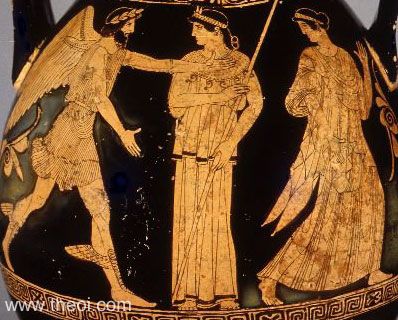
Homer, Iliad 20. 219 ff (trans. Lattimore) (Greek epic C8th B.C.) :
"Erikhthonios (Erichthonius) [King of Troy], who became the richest of mortal men, and in his possession
were three thousand horses who pastured along the low grasslands, mares in their price with their young colts;
and with these Boreas fell in love as they pastured there, and took on upon him the likeness of a dark-maned
stallion, and coupled with them, and the mares conceiving of him bore to him twelve young horses. Those, when
they would play along the grain-giving tilled land would pass along the tassels of corn and not break the divine
yield, but again, when they played across the sea's wide ridges they would run the edge of the wave where it
breaks on the grey salt water."
Quintus Smyrnaeus, Fall of Troy 8. 239 ff (trans. Way) (Greek epic C4th A.D.)
:
"[The horses of Ares :] Aithon (Aethon, Red-fire) and Phlogios (Phlogius, Flame), Konabos (Conabus, Tumult)
and Phobos (Phobus, Panic-fear), his [Ares] car-steeds, bare him down into the fight, the coursers which to
roaring Boreas grim-eyed Erinnys bare."
Quintus Smyrnaeus, Fall of Troy 1. 166 ff :
"She [the Amazon Penthesilea] in pride of triumph on she rode throned on a goodly steed and fleet, the gift
of Oreithyia, wild Boreas' (North-wind's) bride, given to her guest the warrior-maid, what time she came to
Thrake (Thrace), a steed whose flying feet could match the Harpyiai's (Harpies') wings."
[N.B. The horse was presumably sired by Thrakian Boreas on the Harpyia (Harpy).]
Aelian, On Animals 4. 6 (trans. Scholfield) (Greek natural history C2nd A.D.)
:
"Horse-keepers frequently testify to mares being impregnated by the Wind, and to their galloping against
Notos (Notus, the South Wind) or Borras (Boreas, the North). And the same poet [Homer] knew this when he said
‘Of them was Boreas enamoured as they pastured.’ Aristotle too, borrowing (as I think) from him,
said that they rush away in frenzy straight in the face of the aforesaid Autai (Winds) [Anemoi]."
Virgil, Georgics 3. 267 ff (trans. Fairclough) (Roman bucolic C1st B.C.) :
"But surely the madness of mares surpasses all. Venus [Aphrodite] herself inspired their frenzy, when the
four Potnian steeds tore with their jaws the limbs of Glaucus. Love leads them over Gargarus and over the
roaring Ascanius; they scale mountains, they swim rivers. And, soon as the flame has stolen into their craving
marrow (chiefly in spring, for in spring the heart returns to their breasts), they all, with faced turned to
Zephyrus (the West Wind), stand on a high cliff, and drink the gentle breezes. Then oft, without any wedlock,
pregnant with the wind (a wondrous tale!) they flee over rocks and crags and lowly dales, not towards your
rising, Eurus (the East Wind), nor the Sun's, but to Boreas (the North), and Auster (the North-West), or thither
whence rises blackest Notus (the South), saddening the sky with chilly rain."
Nonnus, Dionysiaca 37. 155 ff (trans. Rouse) (Greek epic C5th A.D.) :
"First Erekhtheus (Erechtheus) [King of Athens] brought his horse Xanthos (Xanthus, Bayard) under the yoke,
and fastened in his mare Podarkes (Podarces, Swiftfoot); both sired by North-Wind Boreas in winged coupling when
he dragged a Sithonian Harpyia Aellopos (Harpy Aellopus) to himself, and Wind gave them as loveprice to his
godfather Erekhtheus when he stole Attic Oreithyia for his bride."
OTHER CHILDREN OF BOREAS
Callimachus, Hymn 4 to Delos 292 ff (trans. Mair) (Greek poet C3rd B.C.) :
"The first to bring thee [Apollon's sanctuary on Delos] these offerings from the fair-haired Arimaspoi
(Arimaspians) were Oupis (Opis) and Loxo and happy Hekaerge (Hecaerge), daughters of Boreas, and those who then
were the best of the young men. And they returned not home again, but a happy fate was theirs, and they shall
never be without glorious."
Quintus Smyrnaeus, Fall of Troy 1. 683 ff (trans. Way) (Greek epic C4th A.D.)
:
"The Aurai (Aurae, Breezes), Boreas' (North-Wind's) fleet-winged daughters."
Diodorus Siculus, Library of History 5. 50. 2 (trans. Oldfather) (Greek historian
C1st B.C.) :
"The myth relates that two sons, Boutes (Butes) and Lykourgos (Lycurgus), were born to Boreas, but not by
the same mother; and Boutes, who was the younger, formed a plot against his brother [and was exiled from Thrake
(Thrace)]."
Aelian, On Animals 11. 1 (trans. Scholfield) (Greek natural history C2nd A.D.)
:
"The race of the Hyperboreoi (Hyperboreans, People Beyond the North) and the honours there paid to Apollon
are sung of by poets . . . This god has as [Hyperborean] priests the sons of Boreas (North Wind) and Khione
(Chione, Snow), three in number, brothers by birth, and six cubits in height [approximately ten metres]."
BOREAS & THE POET MUSAEUS (MUSAIOS)
Pausanias, Description of Greece 1. 22. 7 (trans. Jones) (Greek travelogue C2nd A.D.)
:
"I have read verse in which Musaios (Musaeus) [the poet] receives from Boreas the gift of flight, but, in
my opinion, Onomakritos (Onomacritus) wrote them."
[N.B. Musaios and Onomakritos were both Orphic poets.]
BOREAS' RESCUE LETO FROM PYTHON
Apollon, Leto and Boreas were the patron gods of the mythical Hyperboreans. In the story of the Apollon's birth, Boreas rescues the pregnant Leto from the monster Python.
Pseudo-Hyginus, Fabulae 53 (trans. Grant) (Roman mythographer C2nd A.D.) :
"Latona [Leto] was borne there [to the island of Ortygia] at Jove's [Zeus'] command by the wind Aquilo
[Boreas], at the time when the Python was pursuing her, and there, clinging to an olive, she gave birth to
Apollo and Diana [Artemis]. This island later was called Delos."
Pseudo-Hyginus, Fabulae 140 :
"When Python knew that Latona [Leto] was pregnant by Jove [Zeus], he followed her to kill her. But by order
of Jove the wind Aquilo [Boreas] carried Latona away, and bore her to Neptunus [Poseidon]. He protected her, but
in order not to make voice Juno's [Hera's] decree, he took her to the island Ortygia, and covered the island
with waves."
For MORE information on this Titanis see LETO
BOREAS & THE LAND OF THE HYPERBOREANS
Hyperborea was a mythical land which lay "Beyond the North-Wind." It was a realm of eternal spring untouched by the wintry breath of Boreas.
Pindar, Olympian Ode 3. 31 ff (trans. Conway) (Greek lyric C5th B.C.) :
"And in that search he saw, too, the famed land [Hyperborea] that lay behind cold Boreas of bleak and
frozen breath."
Aeschylus, Fragment 109 Prometheus Unbound (from Galen,
Commentary on Hippocrates' Epidemics 6. 17. 1) (trans. Weir Smyth) (Greek tragedy C5th B.C.) :
"[Prometheus directs Herakles (Heracles) to the far west via Hyperborea in his quest for
the golden apples of the Hesperides :] Follow this straight road; and, first of all, thou shalt come to the
Boreades (North-Winds), where do thou beware the roaring hurricane, lest unawares it twist thee up and snatch
thee away in wintry whirlwind."
Callimachus, Hymn 4 to Delos 292 ff (trans. Mair) (Greek poet C3rd B.C.) :
"The first to bring thee [Apollon's sanctuary on Delos] these offerings from the fair-haired Arimaspoi
(Arimaspians) were Oupis (Opis) and Loxo and happy Hekaerge (Hecaerge), daughters of Boreas, and those who then
were the best of the young men. And they returned not home again, but a happy fate was theirs, and they shall
never be without glorious."
Pausanias, Description of Greece 5. 7. 8 (trans. Jones) (Greek travelogue C2nd A.D.)
:
"The land of the Hyperboreans, men living beyond the home of Boreas (the North Wind)."
Aelian, On Animals 11. 1 (trans. Scholfield) (Greek natural history C2nd A.D.)
:
"The race of the Hyperboreoi (Hyperboreans, People Beyond the North) and the honours there paid to Apollon
are sung of by poets . . . This god has as [Hyperborean] priests the sons of Boreas (North Wind) and Khione
(Chione, Snow), three in number, brothers by birth, and six cubits in height [approximately ten metres]."
Pliny the Elder, Natural History 4. 88 (trans. Rackham) (Roman encyclopedia C1st
A.D.) :
"Last of all in the rear of the Maeotae [a Skythian (Scythian) tribe] are the Arimasi (Arimaspians). Then
come the Ripaean Mountains [the Carpathians?] and the region called Peterophorus, because of the feather-like
snow continually falling there; it is a part of the world that lies under the condemnation of nature and is
plunged in dense darkness, and occupied only by the work of frost and the chilly lurking-places of Aquilo (the
North Wind) [Boreas]. Behind these mountains and beyond Aquilo [Boreas] there dwells--if we can believe it--a
happy race of people called the Hyperboreans."
Pliny the Elder, Natural History 7. 10 :
"A tribe is reported next to these [i.e. the Skythians (Scythians)], towards the North, not far from the
actual quarter where Aquilo (the North Wind) [Boreas] rises and the cave that bears its name, the place called
the Earth's Door-Bolt (Ges Clithron)--the Arimaspi (Arimaspians)."
Seneca, Phaedra 935 ff (trans. Miller) (Roman tragedy C1st A.D.) :
"Beyond the reach of winter [the mythical northern realm of Hyperborea] and his hoar snows, thou leave
behind thee the threatening rage of cold Boreas (the North Wind)."
For MORE information on this realm see HYPERBOREA
THE CONTEST OF BOREAS & HELIUS (HELIOS) THE SUN
Aesop, Fables 18 (trans. Gibbs) (Greek fable C6th B.C.) :
"Boreas (the North Wind) and Helios (Helius, the Sun) disputed as to which was the most powerful, and
agreed that he should be declared the victor who could first strip a wayfaring man of his clothes. Boreas (the
North Wind) first tried his power and blew with all his might, but the keener his blasts, the closer the
traveler wrapped his cloak around him, until at last, resigning all hope of victory, the Wind called upon Helios
(the Sun) to see what he could do. Helios (the Sun) suddenly shone out with all his warmth. The traveler no
sooner felt his genial rays than he took off one garment after another, and at last, fairly overcome with heat,
undressed and bathed in a stream that lay in his path. Persuasion is better than force."
For MORE information on this god see HELIOS
BOREAS GOD OF THE NORTH WIND
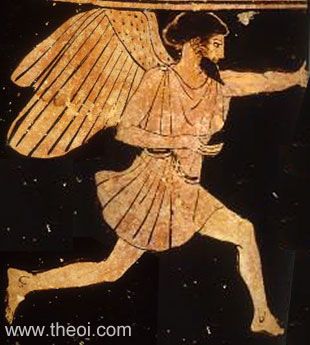
Homer, Iliad 23. 194 ff (trans. Lattimore) (Greek epic C8th B.C.) :
"The pure of the dead Patroklos (Patroclus) would not light. Then swift-footed brilliant Akhilleus
(Achilles) thought of one more thing that he must do. He stood apart from the pyre and made his prayer to the
two winds Boreas and Zephryos (Zephyrus), north wind and west, and promised them splendid offerings, and much
outpouring from a golden goblet entreated them to come, so that the bodies might with best speed burn in the
fire and the timber burst into flame. And Iris, hearing his prayer, went swiftly as messenger to the Winds for
him. Now the Winds assembled within the house of storm-blowing Zephyros were taking part in a feast, and Iris
paused in her running and stood on the stone doorsill; but they, when their eyes saw her, sprang to their feet,
and each one asked her to sit beside them. But she refused to be seated and spoke the word to them: ‘I
must not sit down. I am going back to the running waters of Okeanos (Oceanus) and the Aithiopians' (Ethiopians')
land, where they are making grand sacrifice to the immortals; there I, too, shall partake of the sacraments. But
Akhilleus' prayer is that Boreas and blustering Zephyros may come to him, and he promises them splendid
offerings, so that you may set ablaze the funeral pyre, whereon lies Patroklos, with all Akhaians (Achaeans)
mourning about him.’
She spoke so, and went away, and they with immortal clamour rose up, and swept the clouds in confusion before
them. They came with a sudden blast upon the sea, and the waves rose under the whistling wind. They came to the
generous Troad and hit the pure, and a huge inhuman blaze rose, roaring. Nightlong they piled the flames on the
funeral pyre together and blew with a screaming blast . . .
At that time when Eosphoros (the Dawn-Star) passes across earth, harbinger of light, and after him Dawn of the
saffron mantle is scattered across the sea, the fire died down and the flames were over. The Winds took their
way back toward home again, crossing the Thrakian (Thracian) water, and it boiled with a moaning swell as they
crossed it."
Homer, Iliad 9. 4 ff :
"As two winds rise to shake the sea where the fish swarm, Boreas and Zephyros (Zephyrus), north wind and
west, that blow from Thraceward, suddenly descending, and the darkened water is gathered to crests, and far
across the salt water scatters the seaweed."
Homer, Odyssey 5. 291 ff (trans. Shewring) (Greek epic C8th B.C.) :
"[Poseidon] massed the clouds, clutched his trident and churned the ocean up; he roused all the blasts of
all the Winds and swathed earth and sea alike in clouds; down from the sky rushed the dark. Euros (the East
Wind) and Notos (the South Wind) clashed together, the stormy Zephyros (the West Wind) and the sky-born
billow-driving Boreas (the North Wind)."
Hesiod, Works and Days 504 ff (trans. Evelyn-White) (Greek epic C8th or C7th B.C.)
:
"Avoid the month Lenaeon [late January, early February], wretched days, all of them fit to skin an ox, and
the frosts which are cruel when Boreas (the North Wind) blows over the earth. He blows across horse-breeding
Thrake (Thrace) upon the wide sea and stirs it up, while earth and the forest howl. On many a high-leafed oak
and thick pine he falls and brings them to the bounteous earth in mountain glens: then all the immense wood
roars and the beasts shudder and put their tails between their legs, even those whose hide is covered with fur;
for with his bitter blast he blows even through them although they are shaggy-breasted. He goes even through an
ox's hide; it does not stop him. Also he blows through the goat's fine hair. But through the fleeces of sheep,
because their wool is abundant, the keen wind Boreas pierces not at all; but it makes the old man curved as a
wheel ... the dawn is chill when Boreas has once made his onslaught, and at dawn a fruitful mist is spread over
the earth from starry heaven upon the fields of blessed men: it is drawn from the ever flowing rivers and is
raised high above the earth by windstorm, and sometimes it turns to rain towards evening, and sometimes to wind
when Thrakian Boreas huddles the thick clouds. Finish your work and return home ahead of him, and do not let the
dark cloud from heaven wrap round you and make your body clammy and soak your clothes. Avoid it; for this is the
hardest month, wintry, hard for sheep and hard for men."
Hesiod, Catalogues of Women and Eoiae Fragment 68 (from Berlin Papyri 10560) :
"From stately trees the fair leaves fell in abundance fluttering down to the ground, and the fruit fell to
the ground because Boreas (the North Wind) blew very fiercely at the behest of Zeus; the deep seethed and all
things trembed at his blast : the strength of mankind consumed away and the fruit failed in the season of
spring."
Ibycus, Fragment 284 (trans. Campbell, Vol. Greek Lyric III) (C6th B.C.) :
"Thrakios (Thracian) Boreas with lightning rushing."
Simonides, Fragment 535 (from Himerius, Oration) (trans. Campbell, Vol. Greek Lyric
III) (C6th to 5th B.C.) :
"The cables of the ship [i.e. the ship represented in the Panathenaic festival] will be untied by an ode,
the ode which a holy chorus of Athenians chants, summoning the Anemos (Wind) to the boat, bidding it be present
and fly in company with the sacred vessel; and the Anemos [probably Boreas], doubtless recognising its very own
ode [the Kean (Cean) ode] which Simonides sang to it after the sea-battle, at once obeys the music and blowing
hard astern drives the ship with its blast on the prosperous voyage. For now I wish to summon the Anemos (Wind)
[to blow favourable for a voyage] in poetic fashion, but not having the ability to utter poetic words I wish to
address the Anemos in accordance with the Kean Mousa (Cean Muse)."
Simonides, Fragment 6 (trans. Gerber, Vol. Greek Elegiac) (C6th to 5th B.C.) :
"Of that which Boreas (the North Wind), rushing swiftly from Thrake (Thrace), once covered the sides of
Olympos (Olympus), so that it gnawed the hearts of cloakless men but was humbled when claid alive in Pierian
soil--of that let someone pour me my share."
Bacchylides, Fragment 13 (trans. Campbell, Vol. Greek Lyric IV) (C5th B.C.)
:
"On a dark-blossoming sea Boreas (the North Wind) rends men's hearts with the billows, coming face to face
with them as night rises up, but ceases on the arrival of Eos (the Dawn) [his mother] who gives light to mortals
and a gentle breeze levels the sea, and they belly out their sail before Notos' (the South Wind's) breath."
Aeschylus, Doubtul Fragment 261 (from Strabo, Geography 4. 1. 7) (trans. Weir Smyth)
(Greek tragedy C5th B.C.) :
"The black North (melamboreas), a blast violent and chilling, descends in a tempest."
Aristophanes, Birds 1397 ff (trans. O'Neill) (Greek comedy C5th to 4th B.C.)
:
"Now rushing along the tracks of Notos (the South Wind), now nearing Boreas (the North Wind) across the
infinite wastes of the Aither (Upper Air)."
Plato, Laws 661a (trans. Lamb) (Greek philosopher C4th B.C.) :
"Nor does he outpace in speed of foot Thrêikion (Thracian) Boreas."
Apollonius Rhodius, Argonautica 2. 993 ff (trans. Rieu) (Greek epic C3rd B.C.)
:
"Zeus once more sent forth Boreas (the North Wind), and with his help the Argonauts stood out from the
curving shore where the Amazones (Amazons) of Themiskyra (Themiscyra) were arming for battle."
Apollonius Rhodius, Argonautica 2. 1099 ff :
"Zeus had roused Boreas (the North Wind) to show his might, and signalled by a downpour the rainy advent of
Arktouros [i.e. the constellation Arcturus, whose rising signalled the onset of the rainy season]. All day
Boreas blew softly though the topmost branches of the mountain trees and scarcely stirred the leaves. But at
nightfall he fell on the sea with tremendous force and raised the billows with his shrieking blasts."
Callimachus, Hymn 3 to Artemis 114 ff (trans. Mair) (Greek poet C3rd B.C.)
:
"To Thrakian Haimos (Thracian Mount Haemus), whence comes the hurricane of Boreas (the North Wind) bringing
evil breath of frost to cloakless men."
Callimachus, Hymn 4 to Delos 25 ff :
"What defence is there more steadfast? Walls and stones may fall before the blast of Strymonian Boreas; but
a god is unshaken for ever."
Callimachus, Hymn 4 to Delos 64 ff :
"[Ares] sitting armed on the high top of Thrakian Haimos (Thracian Mount Haemus), and his horses were
stalled by the seven-chambered cave of Boreas."
Quintus Smyrnaeus, Fall of Troy 1. 624 ff (trans. Way) (Greek epic C4th A.D.)
:
"Some tall pine snapped by the icy mace of Boreas, earth's forest-fosterling reared by a spring to stately
height, amidst long mountain-glens."
Quintus Smyrnaeus, Fall of Troy 3. 698 ff :
"For honour to [Thetis] the Goddess, Nereus' child, he [Zeus] sent to Aiolos (Aeolus) Hermes, bidding him
summon the sacred might of his swift Anemoi (Winds), for that the corpse of Aiakos' (Aeacus') son [Akhilleus
(Achilles)] must now be burned. With speed he went, and Aiolos refused not : tempestuous Boreas (the North Wind)
in haste he summoned, and the wild blast of Zephyros (the West Wind); and to Troy sped they on their whirlwind
wings. Fast in mad onrush, fast across the deep they darted; roared beneath them as they flew the sea, the land;
above crashed thunder-voiced clouds headlong hurtling through the firmament. Then by decree of Zeus down on the
pyre of slain Akhilleus, like a charging host swooped they; upleapt the Fire-god's madding breath: uprose a long
wail from the Myrmidones. then, though with whirlwind rushes toiled the Winds, all day, all night, they needs
must fan the flames ere that death-pyre burned out. Up to the heavens vast-volumed rolled the smoke. The huge
tree-trunks groaned, writhing, bursting, in the heat, and dropped the dark-grey ash all round. So when the Winds
had tirelessly fulfilled their mighty task, back to their cave they rode cloud-charioted."
Quintus Smyrnaeus, Fall of Troy 4. 550 ff :
"Wild as the blasts of roaring Boreas (the North Wind) or shouting Notos (the South Wind), when with
hurricane-swoop he heaves the wide sea high, when in the east uprises the disastrous Altar-star [in November]
bringing calamity to seafarers."
Quintus Smyrnaeus, Fall of Troy 5. 408 ff :
"Thick as the leaves which the strong Boreas' (the North-Wind's) might strews, when the waning year to
winter turns."
Quintus Smyrnaeus, Fall of Troy 8. 50 ff :
"As flees the cloud-rack through the welkin wide scourged onward by Boreas' (the North-Wind's) Titan
blasts, when winter-tide and snow are hard at hand, and darkness overpalls the firmament."
Quintus Smyrnaeus, Fall of Troy 8. 204 ff :
"He fell, like stately pine or silver fir uprooted by the fury of Boreas (the North Wind)."
Quintus Smyrnaeus, Fall of Troy 11. 130 ff :
"As waves on-rolled by Boreas (the North Wind) foaming from the deep to the strand, are caught by another
blast that whirlwind-like leaps, in a short lull of the north-wind, forth, smites them full-face, and hurls them
back from the shore."
Quintus Smyrnaeus, Fall of Troy 12. 189 ff :
"Zeus, at the utmost verge of earth, was ware of all: straight left he Okeanos's (Oceanus') stream, and to
wide heaven ascended, charioted upon the Anemoi (Winds), Euros (the East Wind), Boreas (the North), Zephyros
(the West), and Notos (the South) [i.e. probably here imagined in the form of horses] : for Iris rainbow-plumed
led 'neath the yoke of his eternal ear that stormy team, the ear which Aion (Aeon, Time) the immortal framed for
him of adamant with never-wearying hands."
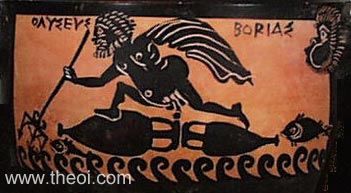
Orphic Hymn 80 to Boreas (trans. Taylor) (Greek hymns C3rd B.C. to 2nd A.D.)
:
"To Boreas (the North-Wind), Fumigation from Frankincense. Boreas, whose wintry blasts, terrific, tear the
bosom of the deep surrounding air; cold icy power, approach, and favouring blow, and Thrake awhile desert,
exposed to snow: the air's all-misty darkening state dissolve, with pregnant clouds whose frames in showers
resolve. Serenely temper all within the sky, and wipe from moisture aither's splendid eye."
Pankrates, Antinous (trans. Page, Vol. Select Papyri III, No. 128) (Greek poetry C2nd
A.D.) :
"He raged like a wave of the surging sea, when Zephyros (the West Wind) is awaked after the wind from
Strymon [i.e. Boreas, the North Wind]."
Anonymous (perhaps Pamprepius of Panopolis), Two Poems Fragments (trans. Page, Vol.
Select Papyri III, No. 140) (Greek poetry C4th A.D.) :
"A song which the blast of wind from snowy Threike (Thrace) [i.e. Boreas], dancing upon the wintry waves of
the sea, sings to the surge at dawn. And sweetly it sings how the snow-white brightness of blazing Phaethon
[Helios the Sun] is quenched by the liquid streams of rainclouds, and the fiery ((lacuna)) . . of the dog-star
is extinguished by the watery snowstorms."
Ovid, Metamorphoses 1. 56 ff (trans. Melville) (Roman epic C1st B.C. to C1st A.D.)
:
"The World's Creator (Fabricator Mundi) [perhaps Khronos (Chronos), Father Time?] did not grant
the Venti (Winds) [Anemoi] full freedom of the sky; who, even so, though each in separate regions rules his
blasts, can well nigh tear the world apart, so fierce is brother's strife . . . To Scythia and the wastes
beneath the Wain blustering Boreas (the North Wind) marched."
Ovid, Metamorphoses 1. 262 & 326 ff :
"[Zeus plans the great Deluge :] Swiftly within the Aeolus' cave he [Zeus] locked Aquilo (the North Wind)
[Boreas] and the gales that drive away the gathered clouds . . . [and when] Juppiter [Zeus] saw the world a
waste of waters, and of so many millions but one man alive . . . he bade the clouds disperse, and Aquilo (the
North Wind) [Boreas] to drive the storms away."
Ovid, Metamorphoses 6. 681 ff :
"[Boreas speaks :] ‘Force is what fits me, force! By force I drive the weeping clouds, by force I
whip the sea, send gnarled oaks crashing, pack the drifts of snow, and hurl the hailstones down upon the lands.
I, when I meet my brothers in the sky, the open sky, my combat field, I fight and wrestle with such force that
heaven's height resounds with our collisions and a blaze of fire struck from the hollow clouds leaps forth. I,
when I've pierced earth's vaulted passageways and in her deepest caverns strain and heave my angry shoulders, I
put ghosts in fear, and with those tremors terrify the world . . .’
With words like these or others no less high, he waves his wings and, as they beat, the whole world felt the
blast and all the wide sea surged. Trailing his dusty cloak across the peaks, he swept the ground and, clothed
in darkness."
Ovid, Heroides 11. 9 ff (trans. Showerman) (Roman poetry C1st B.C. to C1st A.D.)
:
"Fierce as he [Aiolos (Aeolus)] is, far harsher than his own Euri (East-Winds) . . . Surely, something
comes from a life with savage winds; his temper is like that of his subjects. It is Notus (the South Wind), and
Zephyrus (the West Wind), and Sithonian Aquilo [Boreas the North Wind], over whom he rules, and over thy
pinions, wanton Eurus. He rules the winds."
Ovid, Heroides 13. 15 ff :
"Boreas (the North Wind) came swooping down, seized on and stretched your sails."
Ovid, Heroides 18. 37 ff :
"[The lover Leandros (Leander) prays for gentle seas :] ‘But thou, most ungentle of the sweeping
winds, why art thou bent on waging war with me? It is I, O Boreas, if thou dost not know, and not the waves,
against whom thou ragest! What wouldst thou do, were it not that love is known to thee? Cold as thou art, canst
thou yet deny, base wind that of yore thou wert aflame with Actaean fires? If, when eager to seek thy joys,
someone were to close to thee the paths of air, in what wise wouldst thou endure it? Have mercy on me, I pray;
be mild, and stir a more gentle breeze--so may Hippotades [Aiolos (Aeolus)] lay
upon thee no harsh command.’"
Ovid, Heroides 21. 41 ff :
"Tossed like a ship which steadfast Boreas (the North Wind) drives out into the deep, and tide and wave
bring back."
Virgil, Georgics 2. 316 ff (trans. Fairclough) (Roman bucolic C1st B.C.) :
"When Boreas (the North Wind) blows, then winter grips the land with frost."
Virgil, Georgics 3. 196 ff :
"When gathered Aquilo (the North Wind) [Boreas] swoops down from Hyperborean coasts, driving on Scythia's
storms and dry clouds, then the deep cornfields and the watery plains quiver under the gentle gusts, the
treetops rustle, and long rollers press shoreward; on flies the wind, sweeping his flight the fields and seas
alike."
Seneca, Medea 329 ff (trans. Miller) (Roman tragedy C1st A.D.) :
"[Before men first sailed the seas :] Unsullied the ages our fathers saw . . . Then every man inactive kept
to his own shores and lived to old age on ancestral fields, rich with but little, knowing no wealth save what
his home soil had yielded. Not yet could any read the sky and use the stars with which the heavens are spangled;
not yet could ships avoid the rainy Hyades . . . not yet did Boreas (the North Wind), not yet Zephyrus (the West
Wind) have names."
Seneca, Oedipus 473 ff :
"Those wandering tribes [the Thrakians (Thracians)] whom neighbouring Boreas smites."
Seneca, Phaedra 935 ff :
"Beyond the reach of winter and his hoar snows, thou leave behind thee the threatening rage of cold Boreas
(the North Wind)."
Seneca, Phaedra 1128 ff :
"The mountain-peaks, lifted to airy heights, catch Euros (the East Wind), catch Notos (the South Wind), mad
Boreas' (the North Wind's) threats, and the rain-fraught Corus (North-West Wind) [Greek Skiron]."
Seneca, Troades 395 ff :
"As clouds, which but now we saw lowering, are scattered by the cold blasts of Boreas (the North
Wind)."
Valerius Flaccus, Argonautica 1. 574 ff (trans. Mozley) (Roman epic C1st A.D.)
:
"Meantime fierce Boreas (the North Wind) from his eyrie in Pangaeus spied the sails [of the Argonauts] set
to the wind in the midst of the deep, and straightway turns his rapid course to Aeolia and the Tyrrhene caves.
Every forest groans beneath the speeding wings of the god, the crops are laid, and the sea darkens beneath his
hurtling flight. There stand in the Sicilian Sea on the side of retreating Pelorum a crag, the terror of the
straits; high as are the piles it lifts into the air, even so deep are those that sink below the surface of the
waters; and hard by may one see another land with rocks and caverns no less terrible; in the former dwell Acamas
and naked Pyragmon, the latter is the home of Squalls and Winds and shipwrecking Storms; from here they pass to
the lands over the wide ocean, from here in bygone days would they spread turmoil in the heavens and in the
disastrous sea--for at that time no Aeolus was their master . . .--until the All-powerful [Zeus] thundered from
sky upon the trembling blasts and appointed them a king [Aiolos (Aeolus)], whom the fierce band were bidden to
revere; iron and a twofold wall of rocks quell Euros (the East Wind) within the mountain. When the king can no
longer curb their roaring mouths, then of his own will he unbars the doors and by granting egress lulls their
savage complaints. Boreas now with these tidings drives him from his lofty throne : ‘Ah! What monstrous
deed, Aeolus, have I spied from the heights of Pangaeus! Grecian heroes have devised a strange engine with the
axe [a boat], and now triumph joyously over the seas with a huge sail, nor have I power of myself to stir up the
sea from its sandy depths, as I had or ever I was fettered and imprisoned. This it is that gives them courage
and confidence in the vessel they have built, that they see Boreas ruled by a king. Grant me to overwhelm the
Greeks with their mad bark : the thought of my children [the Boreades on the Argo] moves me not, only do thou
quench these threats of mortal man, while still the shores of Thesally and as yet no other lands have seen their
sails.’
He ceased speaking: but within all the Winds began to roar and clamour for the open sea. Then did Hippotades
[Aiolos (Aeolus), son of Hippotas] drive against the mighty door with a whirling blast. Joyfully from the prison
burst the Thracian horses, Zephyros (the West Wind) and Notus (the South Wind) of the night-dark pinions with
all the sons of the Storms, and Eurus (the East Wind) his hair dishevelled with the blasts, and tawny with too
much sand; they drew the tempest on, and in thunderous advance together drive the curling waves to shore, and
stir not the trident's realms alone, for at he same time the fiery sky falls with a mighty peal, and night
brings all things beneath a pitchy sky. The oars are dashed from the rowers' hands; the ship's head is turned
aslant, and on her she receives the sounding shocks; a sudden whirlwind tears away the sails that flap over the
tottering mast."
Valerius Flaccus, Argonautica 6. 164 ff :
"Boreas drives not so many billows from ocean's bounds, nor so answers his brothers [the other Anemoi] from
opposing waves."
Statius, Thebaid 1. 346 ff (trans. Mozley) (Roman epic C1st A.D.) :
"And now the rocky prisons of Aeolia are smitten and groan, and the coming storm threatens with hoarse
bellowing: the Venti (Winds) [Anemoi] loud clamouring meet in conflicting currents, and fling loose heaven's
vault from its fastened hinges, while each strives for mastery of the sky; but Auster (the South Wind) [Notos]
most violent thickens gloom on gloom with whirling eddies of darkness, and pours down rain which keen Boreas
(the North Wind) with his freezing breath hardens into hail; quivering lightnings gleam, and from colliding air
bursts sudden fire."
Statius, Thebaid 8. 422 :
"When threatening Jove [Zeus] has loosed the reins of winds and tempests, and sends alternate hurricanes to
afflict the world, opposing forces meet in heaven, now Auster's (the South Wind's) storms prevail, now Aquilo's
(the North Wind's) [Boreas'], till in the conflict of the winds one conquers, be it Auster's overwhelming rains,
or Aquilo's clear air."
Musaeus, Hero & Leander 135 ff (Greek poet C6th A.D.)
:
"Sea mingled with upper air, and everywhere rose the sound of warring winds; Euros (the East-Wind) blew
hard against Zephyros (the West-Wind), and Notos (the South-Wind) hurled mighty menacings against Boreas (the
North-Wind) and the din was unrelenting of the loud-thundering sea."
Nonnus, Dionysiaca 1. 68 ff (trans. Rouse) (Greek epic C5th A.D.) :
"And artful Boreas bellied out all her [Europa sitting on the back of Zeus in the form of a bull] shaking
robe with amorous breath, love-sick himself [for Oreithyia], and in secret jealousy, whistled on the pair of
unripe breasts."
Nonnus, Dionysiaca 47. 302 ff (trans. Rouse) (Greek epic C5th A.D.) :
"[Ariadne abandoned on the island of Naxos by Theseus :] She prayed to Boreas and adjured the wind, adjured
Oreithyia [wife of Boreas] to bring back the boy [Theseus] to the land of Naxos and to let her see that sweet
ship again. She besought hardhearted Aiolos (Aeolus) yet more; he heard her prayer and obeyed, sending a
contrary wind to blow, but Boreas lovelorn himself cared nothing for the maid stricken with desire--yes, even
the Aurai (Aurae, Breezes) themselves must have had a spite against the maiden when they carried the ship to the
Athenian land . . . ‘Who stole the man of Athens [Theseus]? If it should be Boreas blowing, I appeal to
Oreithyia [his wife to intervene in the name of love]: but Oreithyia hates me, because she also has the blood of
Marathon [she was an Athenian], whence beloved Theseus came.’"
Suidas s.v. Boras (trans. Suda On Line) (Byzantine Greek lexicon C10th A.D.)
:
"Boras (Of food, prey): Of food or nourishment. But Borras (Boreas) is the wind, and it is declined
Borra [in the genitive]; the nominative plural [is] Borrai. ‘Harsh north winds
blowing.’ . . . [Note that] they consider Boreas an ally of the Athenians. And see the place where the
army of Xerxes suffered misfortune, under Aphetai (Aphetae)."
CULT OF BOREAS
I. ATHENS Chief City of Attica (Attika) (Southern Greece)
Herodotus, Histories 7. 189 (trans. Godley) (Greek historian C5th B.C.) :
"The story is told that because of an oracle the Athenians invoked Boreas, the north wind, to help them,
since another oracle told them to summon their son-in-law as an ally. According to the Hellenic story, Boreas
had an Attic wife, Orithyia, the daughter of Erekhtheus (Erechtheus), ancient king of Athens. Because of
this connection, so the tale goes, the Athenians considered Boreas to be their son-in-law. They were stationed
off Khalkis (Chalcis) in Euboia (Euboea), and when they saw the storm rising, they then, if they had not
already, sacrificed to and called upon Boreas and Orithyia to help them by destroying the barbarian fleet, just
as before at Athos. I cannot say whether this was the cause of Boreas falling upon the barbarians as they lay at
anchor, but the Athenians say that he had come to their aid before and that he was the agent this time. When
they went home, they founded a sacred precinct of Boreas beside the Ilissos (Ilissus) river.
There was no counting how many grain-ships and other vessels were destroyed. The generals of the fleet were
afraid that the Thessalians might attack them now that they had been defeated, so they built a high palisade out
of the wreckage. The storm lasted three days. Finally the [Persian] Magi made offerings and cast spells
upon the Wind [Boreas], sacrificing also to Thetis and the Nereides. In this way they made the Wind stop on the
fourth day--or perhaps it died down on its own."
Philostratus, Life of Apollonius of Tyana 4. 21 (trans. Conybeare) (Greek biography
C1st to C2nd A.D.) :
"Surely you [the Athenians] might have some respect for the Winds that were your allies and once blew
mightily to protect you . . . Boreas who was your patron, and who of all the winds is the most masculine . . .
became the lover of Oreithyia."
Suidas s.v. Aphetai (trans. Suda On Line) (Byzantine Greek lexicon C10th A.D.)
:
"Aphetai (Aphetae) : A place in Athens where the expedition of Xerxes had its first setback because of the
unsuitability of the harbors. For this reason they consider Boreas to be an ally of the Athenians. The god
[Apollon of Delphoi] had prophesied that they should sacrifice to their kinsman wind; he is called kinsman
because of Oreithyia."
II. MEGALOPOLIS Chief City of Arcadia (Southern Greece)
Pausanias, Description of Greece 8. 36. 6 (trans. Jones) (Greek travelogue C2nd
A.D.) :
"On the right of the road [outside Megalopolis, Arkadia (Arcadia)] there has been made a precinct to
Boreas, and the Megalopolitans offer sacrifices every year, holding none of the gods in greater honour than
Boreas, because he proved their saviour from the Lakedaimonians (Lacedaemonians) under Agis."
III. THURII (THOURIOI) Town in Lucania (Southern Italy)
Aelian, Historical Miscellany 12. 61 (trans. Wilson) (Greek rhetorician C2nd to 3rd
A.D.) :
"Dionysios (Dionysius) [tyrant of Syrakousa (Syracuse)] attacked Thourioi (Thurii) with his fleet, bringing
three hundred ships manned with hoplites. A headwind from the north damaged the vessels and destroyed his
armada. As a result Thourioi (Thurii) offered sacrifice to Boreas (the North Wind), decreed rights of
citizenship to the wind (anemos), allocated to it a house and plot of land, and established an annual
festival. So the Athenians were not alone in claiming kinship with him; the Thourians (Thurians) also declared
him to be their benefactor. Pausanias [8.36.6] says the men of Megalopolis did the same."
ANCIENT GREEK & ROMAN ART
SOURCES
GREEK
- Homer, The Iliad - Greek Epic C8th B.C.
- Homer, The Odyssey - Greek Epic C8th B.C.
- Hesiod, Theogony - Greek Epic C8th - 7th B.C.
- Hesiod, Works and Days - Greek Epic C8th - 7th B.C.
- Hesiod, Catalogues of Women Fragments - Greek Epic C8th - 7th B.C.
- Aesop, Fables - Greek Fables C6th B.C.
- Pindar, Odes - Greek Lyric C5th B.C.
- Greek Lyric III Ibycus, Fragments - Greek Lyric C6th B.C.
- Greek Lyric III Simonides, Fragments - Greek Lyric C6th - 5th B.C.
- Greek Lyric IV Bacchylides, Fragments - Greek Lyric C5th B.C.
- Greek Elegaic Theognis, Fragments - Greek Elegaic C6th B.C.
- Aeschylus, Fragments - Greek Tragedy C5th B.C.
- Herodotus, Histories - Greek History C5th B.C.
- Plato, Laws - Greek Philosophy C4th B.C.
- Plato, Phaedrus - Greek Philosophy C4th B.C.
- Apollodorus, The Library - Greek Mythography C2nd A.D.
- Apollonius Rhodius, The Argonautica - Greek Epic C3rd B.C.
- Callimachus, Hymns - Greek Poetry C3rd B.C.
- Diodorus Siculus, The Library of History - Greek History C1st B.C.
- Strabo, Geography - Greek Geography C1st B.C. - C1st A.D.
- Pausanias, Description of Greece - Greek Travelogue C2nd A.D.
- The Orphic Hymns - Greek Hymns C3rd B.C. - C2nd A.D.
- Aelian, On Animals - Greek Natural History C2nd - 3rd A.D.
- Aelian, Historical Miscellany - Greek Rhetoric C2nd - 3rd A.D.
- Athenaeus, Deipnosophistae - Greek Rhetoric C3rd A.D.
- Philostratus, Life of Apollonius of Tyana - Greek Biography C2nd A.D.
- Phlegon of Tralles, Book of Marvels - Greek Paradoxography C2nd A.D.
- Greek Papyri III Pankrates, Fragments - Greek Poetry C2nd A.D.
- Quintus Smyrnaeus, Fall of Troy - Greek Epic C4th A.D.
- Nonnus, Dionysiaca - Greek Epic C5th A.D.
- Musaeus, Hero and Leander - Greek Poetry C6th A.D.
- Greek Papyri III Anonymous, Fragments - Greek Poetry C4th A.D.
ROMAN
- Hyginus, Fabulae - Latin Mythography C2nd A.D.
- Ovid, Metamorphoses - Latin Epic C1st B.C. - C1st A.D.
- Ovid, Fasti - Latin Poetry C1st B.C. - C1st A.D.
- Ovid, Heroides - Latin Poetry C1st B.C. - C1st A.D.
- Virgil, Georgics - Latin Bucolic C1st B.C.
- Propertius, Elegies - Latin Elegy C1st B.C.
- Pliny the Elder, Natural History - Latin Encyclopedia C1st A.D.
- Seneca, Medea - Latin Tragedy C1st A.D.
- Seneca, Oedipus - Latin Tragedy C1st A.D.
- Seneca, Phaedra - Latin Tragedy C1st A.D.
- Seneca, Troades - Latin Tragedy C1st A.D.
- Valerius Flaccus, The Argonautica - Latin Epic C1st A.D.
- Statius, Thebaid - Latin Epic C1st A.D.
BYZANTINE
- Suidas, The Suda - Byzantine Greek Lexicon C10th A.D.
BIBLIOGRAPHY
A complete bibliography of the translations quoted on this page.
